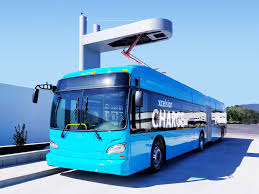
While the push for electric vehicles is growing, there is also a growing dispute between electric bus and diesel advocates and diesel fuel supporters.
As E and E News reported, the dispute revolves around a new study.
A new report has sparked a clash between electric bus and diesel advocates, highlighting a growing debate over the best approach to slashing emissions from transportation.
The report, from the U.S. Public Interest Research Group, Environment America and the Frontier Group, looked at the experiences of six early adopters of electric buses, including transit agencies and school districts.
It found that electric buses can play a pivotal role in reducing carbon emissions from transportation, which in 2017 surpassed the power sector as the country’s largest source of greenhouse gases.
The report’s authors also pulled no punches when it comes to diesel-powered buses.
“Diesel exhaust is a dangerous pollutant containing more than 40 toxic chemicals, including known or suspected carcinogens such as benzene, arsenic and formaldehyde,” the report says.
“Diesel exhaust itself is classed as a potential cancer agent by the U.S. EPA, and at least 19 of the hydrocarbons it contains are known to cause or suspected of causing cancer,” it continues. “In particular, exposure to diesel exhaust has been linked to higher rates of lung cancer and greater risk for bladder cancer.”
Overall, the report found that replacing all of the country’s diesel-powered transit buses with electric buses could eliminate more than 2 million tons of greenhouse gas emissions each year.
“The No. 1 benefit of electric buses is that they have zero tailpipe emissions,” said Matt Casale, transportation campaign director at U.S. PIRG and a co-author of the report.
Casale cited the experience of the Chicago Transit Authority, which rolled out two electric buses in 2014 and hopes to fully electrify its fleet in the coming years. The agency estimates that each electric bus will save around $55,000 in avoided health care costs each year, including avoided hospital visits due to asthma and other respiratory illnesses.
Those findings struck a nerve at the Diesel Technology Forum, a nonprofit group that seeks to raise awareness of the benefits of diesel engines, fuel and technology.
Allen Schaeffer, the group’s executive director, blasted the report as “disingenuous.”
Schaeffer said its authors compared new electric buses with older diesel buses that lack modern emissions controls. About 46% of all diesel school buses and 40% of all diesel transit buses are equipped with modern emissions controls — including particulate filters and catalytic converters — that dramatically lower their tailpipe pollution.
“For groups like U.S. PIRG, which clearly has an agenda here, it’s somewhat disingenuous to not put in perspective the old diesel technology with the new diesel technology,” Schaeffer said. “They’re drawing conclusions that don’t differentiate between old versus new.”
A more accurate source of information about diesel is the Health Effects Institute, said Sarah Dirndorfer, a spokeswoman for the Diesel Technology Forum.
Dirndorfer pointed E&E News to a recent HEI study on diesel emissions. “This well-regarded study found that emissions from new-tech diesel engines deployed with diesel particulate filters yield no adverse health outcomes,” she said in an email.
HEI receives half of its core funding from the automotive industry and half from EPA. Its corporate funders include BMW North America, Detroit Diesel Corp., Ford Motor Co. and Nissan Motor Co. Ltd., according to its website.
Casale, of U.S. PIRG, suggested that industry funding may have influenced HEI’s conclusion that diesel has no negative health outcomes. “Our research indicates otherwise and most of the research out there agrees with us,” he said in a follow-up email.
Dan Greenbaum, president of HEI, didn’t respond to a request for comment.
Successes and failures
Overall, the report by U.S. PIRG paints a nuanced picture of how early adopters of electric buses have fared, highlighting both the benefits and challenges of the transition.
A success story comes from Seneca, S.C., which became the first city in the world to launch an all-electric fleet in 2014.
“The buses have outperformed their diesel equivalents in fuel and maintenance costs and exceeded expectations regarding charging time, range and battery life,” the report says. “Seneca views its electric buses as a successful, scalable model of full-fleet electrification.”
Seneca’s transit agency purchased 10 electric buses from Proterra Inc., a manufacturer headquartered in Silicon Valley.
“We’re excited about the continued momentum of electric bus adoption,” Proterra CEO Ryan Popple said in an email to E&E News. “More than any other form of transportation, battery-electric buses are the cornerstone in addressing the future of mobility and sustainability for cities.”
On the opposite end of the spectrum is Albuquerque, N.M., which postponed its electric bus deployment after a disappointing trial period.
“Albuquerque, NM, experienced perhaps the least successful electric bus rollout in the United States,” the report says. “A string of mechanical problems with the city’s electric buses, coupled with missed deadlines for delivery, inadequate infrastructure planning and a rocky relationship with the bus manufacturer, culminated in the city cancelling its electric bus contract and returning its buses.”
Casale said Albuquerque demonstrates the importance of transit agencies and school districts working with electric utilities and bus manufacturers to ensure a smooth rollout.
Schaeffer, of the Diesel Technology Forum, said Albuquerque illustrates that electric buses are not right for everyone.
“This report presupposes that everybody should switch to electric school buses,” he said. “And for a good portion of America, an electric school bus would not meet their needs and would be a foolish use of taxpayer dollars.”






